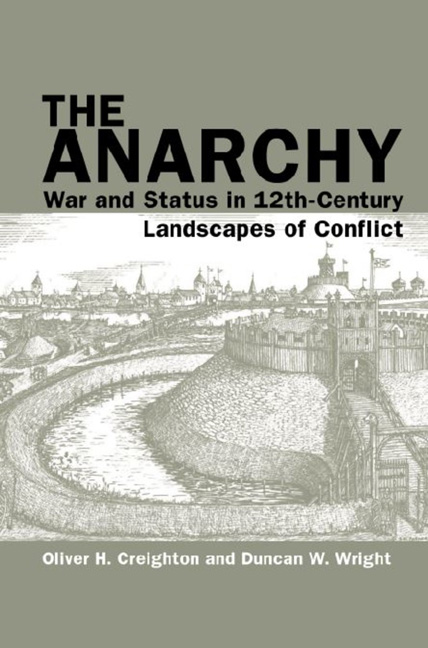Book contents
- Frontmatter
- Contents
- Acknowledgements
- List of Figures
- List of Colour Plates
- Chapter 1 Introduction
- Chapter 2 Historical Outline and the Geography of ‘Anarchy’
- Chapter 3 Waging War: Fields of Conflict and Siege Warfare
- Chapter 4 Architecture and Authority: Castles
- Chapter 5 Material Culture: From Arts to Coins
- Chapter 6 Performing Violence: Arms, Armour and Military Apparel
- Chapter 7 Faith and Fortification: The Church
- Chapter 8 Town, Village and Country
- Chapter 9 Anarchy on the Fen Edge: Case Study of the Isle of Ely
- Chapter 10 The Twelfth-Century Civil War in Context: Assessment and Reassessment
- Appendix Key Sites to Visit
- Bibliography
- Index
- Plate section
Chapter 8 - Town, Village and Country
- Frontmatter
- Contents
- Acknowledgements
- List of Figures
- List of Colour Plates
- Chapter 1 Introduction
- Chapter 2 Historical Outline and the Geography of ‘Anarchy’
- Chapter 3 Waging War: Fields of Conflict and Siege Warfare
- Chapter 4 Architecture and Authority: Castles
- Chapter 5 Material Culture: From Arts to Coins
- Chapter 6 Performing Violence: Arms, Armour and Military Apparel
- Chapter 7 Faith and Fortification: The Church
- Chapter 8 Town, Village and Country
- Chapter 9 Anarchy on the Fen Edge: Case Study of the Isle of Ely
- Chapter 10 The Twelfth-Century Civil War in Context: Assessment and Reassessment
- Appendix Key Sites to Visit
- Bibliography
- Index
- Plate section
Summary
IN THE FINAL thematic chapter of this volume, the focus shifts to the evidence for towns, rural settlements and landscapes. In contrast with castles and siege works, which represent arguably the most conspicuous traces of the civil war in the English landscape, the influence of the conflict upon everyday urban and, especially, rural life is, as will be seen, far less tangible. Major towns were not spared from the flow of the conflict, but in terms of the archaeology of urbanism, the mid-twelfth century is a difficult and somewhat neglected area. Material culture from twelfth-century phases of settlements is typically scant and, again, we must employ an interdisciplinary approach in order to maximise our understanding. This chapter first investigates the different impacts of the conflict upon urban landscapes, with London and Winchester afforded particular attention given the key roles that these centres played, followed by an assessment of the conduct of sieges within and around towns and the evidence for the establishment of new towns and markets. The second half of the chapter turns to the archaeology of the countryside, questioning first whether the Anarchy influenced or affected settlement forms or agricultural regimes, before considering fortified villages and concluding with an overview of the overall evidence for landscape devastation during the conflict.
Major Urban Centres
The conflict of Stephen's reign occurred a good way along the trajectory of urbanisation in England. Against the general sweep of medieval urban history, it represented a relatively minor interruption of a period of sustained growth across c.850–1300, bridging the preceding phase of Norman imposition and the great period of expansion and town foundation that followed. Besides the damaging effects of sieges, the uncertain political environment of the mid-twelfth century exacerbated strains and divisions within urban communities and stalled or damaged commercial growth. In this environment, political favour and location had a considerable bearing on the fortunes of major urban centres, no more so than in the contrasting experiences of London and Winchester.
London and Winchester
While London and its region saw little direct military action, the city still played a pivotal role in unfolding political events. Londoners had enthusiastically acclaimed Stephen as king in 1135 and he held his Christmas court there that year.
- Type
- Chapter
- Information
- The AnarchyWar and Status in 12th-Century Landscapes of Conflict, pp. 219 - 250Publisher: Liverpool University PressPrint publication year: 2017



